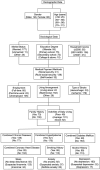Post-stroke fatigue and its correlation with family functioning in patients who have experienced a first episode of stroke
- PMID: 39497785
- PMCID: PMC11532170
- DOI: 10.3389/fnagi.2024.1440163
Post-stroke fatigue and its correlation with family functioning in patients who have experienced a first episode of stroke
Abstract
Objective: This study aimed to analyse the relevant factors that may affect post-stroke fatigue (PSF) in patients with stroke and further explore the correlation between family functioning and PSF.
Methods: Patients who had experienced a first episode of stroke and were admitted to the Department of Neurology of the First Affiliated Hospital of Wenzhou Medical University were rigorously screened. The general data and family functioning of the patients on admission were collected, and their family adaptation, partnership, growth, affection and resolve scores and their PSF on the 5th day of admission were collected using the fatigue severity scale (FSS). Multiple linear regression analysis was then utilized to explore the factors affecting PSF in patients with stroke.
Results: A total of 220 questionnaires were distributed, and 220 were returned, with 212 valid questionnaires and a valid return rate of 96.4%. These 212 patients had a family functioning score of 6.58 ± 2.00 and an FSS score of 36.62 ± 10.96. Spearman's correlation analysis showed negative correlations between the FSS scores and the adaptation, partnership, growth, affection, resolve and family functioning scores (r = -0.380, -0.505, -0.470, -0.303, -0.281 and -0.712, respectively; p < 0.001). Furthermore, multiple linear regression analysis showed that family functioning (β' = -0.516), marital status (β' = -0.244), household income (β' = -0.185), literacy (β' = -0.181) and activities of daily living (β' = -0.084) were influential factors for PSF in patients with stroke (p < 0.05).
Conclusion: There is a significant negative correlation between family functioning and PSF, suggesting that better family functioning may help mitigate the severity of post-stroke fatigue. Healthcare providers should identify interventions to help patients and families address fatigue, boost disease recovery, promote patients' physical and mental health and improve their quality of life.
Keywords: clinical care; family functioning; fatigue severity scale; post-stroke fatigue; stroke.
Copyright © 2024 Zhu, Huang, Yu, Bao, Lin and Shu.
Conflict of interest statement
The authors declare that the research was conducted in the absence of any commercial or financial relationships that could be construed as a potential conflict of interest.
Figures
References
-
- Chase L., Chase R. B. (1976). A statistical power analysis of applied psychological research. J. Appl. Psychol. 61 234–237. 10.1037/0021-9010.61.2.234 - DOI
LinkOut - more resources
Full Text Sources


